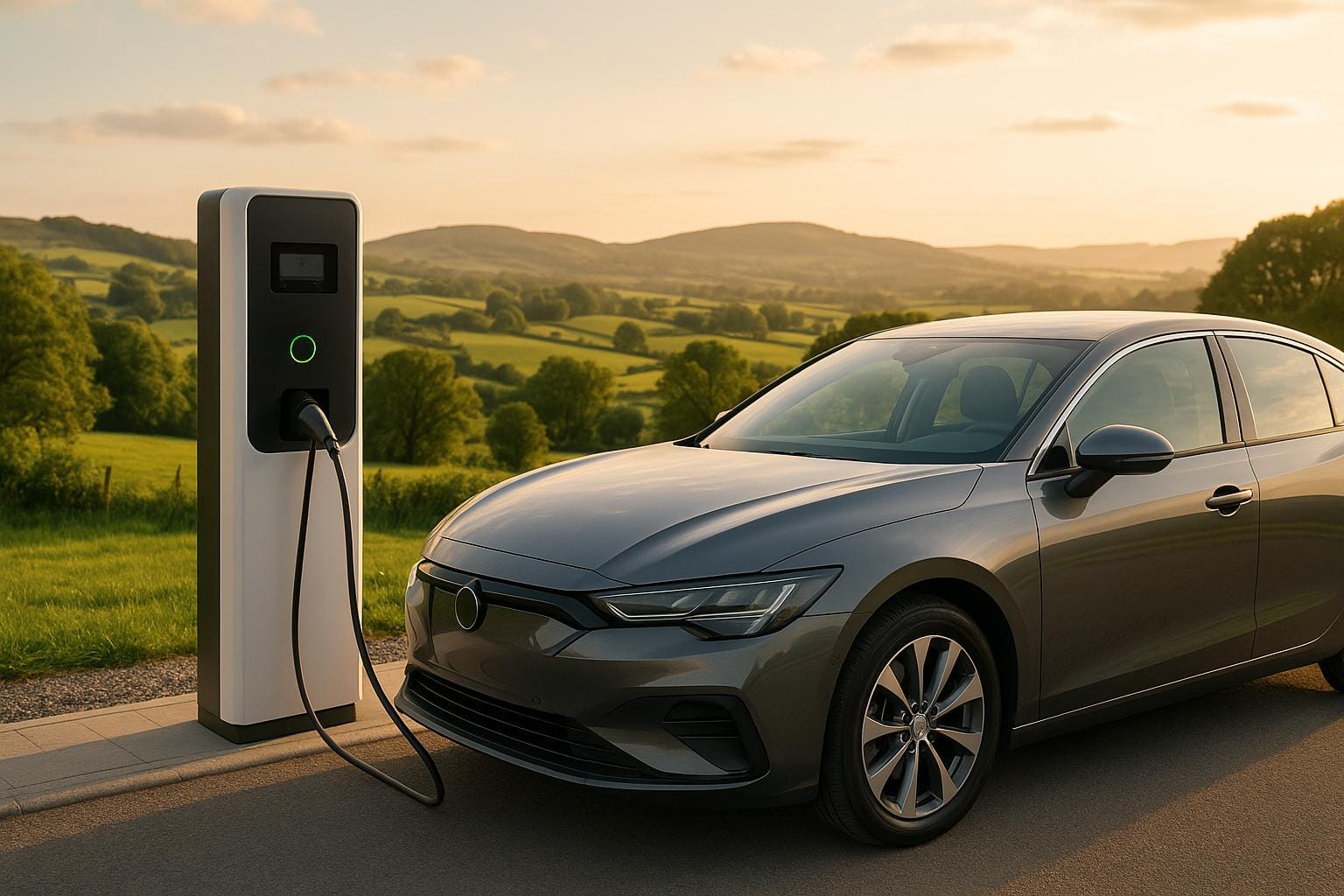Northern Ireland is ramping up efforts to improve its EV charging infrastructure, addressing its lag behind other UK regions. With only 35,600 charge points per 100,000 residents, compared to over 110,000 in England and Scotland, the region faces a significant gap. However, government-backed grant schemes and investments are helping to close this divide.
Key highlights:
- Workplace Charging Scheme: Up to £350 per socket for businesses, charities, and public sector organisations.
- Depot Charging Scheme: Covers 75% of costs, capped at £1 million per organisation, for fleet operators and councils.
- EV Infrastructure Grant: SMEs can claim up to £15,000 per site for staff and fleet charging.
- Landlord Grants: £350 per socket for commercial property owners, with a limit of 100 grants annually.
Recent updates include a £63 million EV investment package announced in July 2025, with £30 million allocated to depot charging. The Depot Charging Scheme, launched in July 2025, has a funding deadline of 28 November 2025, with installations to be completed by 31 March 2026.
These grants aim to boost EV adoption by reducing costs and making charging infrastructure more accessible. With rising interest in EVs, now is the time for businesses and landlords to act. Applications require collaboration with OZEV-approved installers and adherence to strict deadlines. For a greener future, pairing EV charging with solar and battery storage offers long-term cost savings and energy efficiency.
Current EV Charging Grant Schemes
The following section outlines the eligibility criteria and funding specifics for various EV charging grant schemes available in Northern Ireland. These details provide a clear understanding of how each scheme supports the development of EV infrastructure, paving the way for the application process discussed later.
Workplace Charging Scheme
This scheme is open to businesses, charities, public sector organisations, and small accommodation providers. It covers 75% of the total installation costs (including VAT), capped at £350 per socket, with a maximum of 40 sockets per applicant. To qualify, applicants must either own the property or obtain written consent from the landlord for installation. Additionally, the site must have dedicated off-road parking for staff or fleet use. All installations must be carried out by an OZEV-authorised installer to meet safety and funding standards.
Depot Charging Scheme
Fleet operators, local councils, and non-profits can benefit from this scheme, which covers 75% of the costs for chargepoints and associated civil works, up to a maximum of £1 million. Eligible applicants must have been operational for at least one year, own or have landlord consent for the depot, and operate at least one electric commercial vehicle. Installations must be completed by 31 March 2026, and depots need to demonstrate sufficient grid capacity.
Electric Vehicle Infrastructure Grant for Staff and Fleets
Small and medium-sized enterprises (SMEs) with 249 or fewer employees can claim up to £15,000 per site to cover the installation of EV chargepoints and related infrastructure. This grant is specifically aimed at supporting EV adoption for staff and fleet use.
Landlord Grants for Commercial Properties
Commercial property owners can claim up to £350 per socket, with funding available for a maximum of 100 grants per year. This grant allows landlords to improve their properties by installing EV chargepoints, helping tenants transition to electric vehicles.
| Grant Scheme | Eligible Applicants | Maximum Funding | Additional Limits |
|---|---|---|---|
| Workplace Charging Scheme | Businesses, charities, public sector bodies | £350 per socket | Up to 40 sockets per applicant |
| Depot Charging Scheme | Fleet operators, local authorities, non-profits | 75% of costs | £1 million total across sites |
| EV Infrastructure Grant | SMEs (≤249 employees) | £15,000 per site | For staff and fleet use only |
| Landlord Grants | Commercial property owners | £350 per socket | Up to 100 grants per year |
These grant schemes provide vital support for expanding EV infrastructure. The next section will guide you through the application process, helping you take advantage of these opportunities.
Recent Updates and Government Funding
The world of EV charging grants in Northern Ireland has seen some notable changes throughout 2025. The government has rolled out fresh funding initiatives and made adjustments to existing programmes, aiming to boost the region’s transition to electric vehicles.
New Schemes and Investments
One of the standout introductions is the Depot Charging Scheme, launched on 16 July 2025. This initiative focuses on helping commercial fleet operators by offering 75% funding for chargepoint and civil engineering costs at their depot locations.
The scheme is open to public and private sector fleets, local councils, and non-profit organisations, with a funding cap of £1 million per organisation across multiple depot sites. To qualify, applicants need to have been UK-registered fleet operators for at least a year and must own or have placed an order for at least one battery-electric van, HGV, or coach.
All work under this scheme must be completed by 31 March 2026, with applications closing on 28 November 2025.
These new efforts align with the government’s broader strategy, which includes updates to existing programmes.
July 2025 Investment Package
In July 2025, the government announced a £63 million investment package, signalling a strong commitment to expanding EV charging infrastructure across the UK.
Of this, £30 million has been allocated to the Depot Charging Scheme to help tackle one of the biggest hurdles to fleet electrification: insufficient charging facilities at business premises.
Transport Secretary Heidi Alexander highlighted the broader benefits of this funding:
"Our investment is about more than just charging points – it’s about charging up Britain’s economy. I’m proud that through this boost, we are helping deliver cheaper bills for families, massive savings for the NHS to reinvest in patient care, and thousands of new green jobs."
The goal is to expand the UK’s public charging network from 82,000 charge points to 182,000 by 2030. For Northern Ireland, this is especially significant, as the region currently has only 36 public EV chargers per 100,000 people, the lowest ratio in the UK.
Changes to Previous Schemes
Several long-standing programmes have also been updated or replaced.
The On-Street Residential Chargepoint Scheme (ORCS) has officially closed to new applicants. Since its launch in 2017, ORCS funded the installation of 8,354 public charging devices, distributing £31.1 million in grants across 146 local councils. Its closure marks a shift in the government’s focus toward other funding options.
Similarly, the Electric Vehicle Homecharge Scheme (EVHS) has been replaced by the EV Chargepoint Grant. During its operation, EVHS supported the installation of 340,222 home charging devices, with total grants amounting to £140.8 million.
To further encourage EV adoption, the government has unveiled a new £650 million Electric Car Grant scheme, offering direct discounts on eligible electric vehicles. Buyers can receive either £3,750 or £1,500, depending on the vehicle, as long as it’s priced below £37,000.
Minister Liz Kimmins stressed the importance of this initiative:
"Cost is often cited as the biggest barrier to purchasing an electric vehicle and this grant scheme will significantly reduce the cost of a new EV and make that process more affordable."
These updates highlight a shift in government policy, with a focus on blending infrastructure support with incentives for vehicle purchases. This combined approach aims to accelerate the adoption of electric vehicles in Northern Ireland, making the transition smoother and more accessible.
Application Process and Key Deadlines
Applying for EV charging grants requires careful attention to timing and details. Each grant comes with its own set of rules and deadlines, so familiarising yourself with the process early on can mean the difference between securing funding and missing out. Below is a straightforward guide to help you navigate the process.
How to Apply: Step-by-Step Guide
Although the exact steps may differ depending on the grant, most schemes share common requirements. The Office for Zero Emission Vehicles (OZEV) oversees many of these grants, and their website is the go-to resource for applications and updates.
For most grants, you’ll need to collaborate with an OZEV-approved installer who will handle eligibility checks and documentation. Installers are responsible for submitting all necessary paperwork, which typically includes:
- Detailed invoices
- Electrical certifications (Certificate Number 3 and test record sheets)
- Clear photos showing the chargepoint’s serial number and location
For business or landlord grants, a car park diagram may also be required to help assessors understand the layout of your installation. Some grants require you to complete the application before installation begins, while others allow reimbursement applications after the work is finished. Regardless, all documentation must be accurate, complete, and clearly labelled to avoid delays in processing.
Once you’ve gathered the required paperwork, the next step is to focus on meeting the deadlines.
Key Deadlines and Timelines
Timing is everything when applying for EV charging grants, as funds can run out before the official deadlines. For example, the Depot Charging Scheme has an application deadline of 28 November 2025, but funding may be depleted earlier. Installation work for this scheme must be finished by 31 March 2026, with claims submitted no later than 31 May 2026. Meanwhile, the Electric Vehicle Chargepoint Grant (EVCG) and the Workplace Charging Scheme (WCS) are available until 31 March 2026.
Here’s a quick reference table for key deadlines:
| Grant Scheme | Application Deadline | Installation Completion | Claims Submission |
|---|---|---|---|
| Depot Charging Scheme | 28 November 2025 (or when funds exhausted) | 31 March 2026 | 31 May 2026 |
| Electric Vehicle Chargepoint Grant (EVCG) | 31 March 2026 | N/A | N/A |
| Workplace Charging Scheme (WCS) | 31 March 2026 | N/A | N/A |
Some schemes have already closed their application windows. For instance, the ZEVI TII EV Recharging Infrastructure LDV En-Route Grant Scheme Phase 3 stopped accepting applications on 18 June 2025, but successful applicants can continue installation work until 31 March 2026.
Tips for Successful Applications
To improve your chances of securing funding, it’s best to apply as early as possible since funds can run out before the official deadlines. Get quotes, financing documents, and necessary approvals ready in advance. Working with an OZEV-authorised installer who knows the process inside out can help you avoid common mistakes. Make sure all infrastructure work is completed by the required deadlines to qualify for reimbursement, and keep copies of all submitted documents for reference in case of queries during the claims process.
Lastly, keep in mind that the government can modify or end grant schemes at any time. By staying organised and proactive, you can secure funding while contributing to Northern Ireland’s clean energy initiatives.
sbb-itb-d2d975a
Combining EV Charging Grants with Solar and Energy Solutions
Pairing EV charging grants with solar panels and battery storage can help you lower costs while gaining greater control over your energy use. By combining these technologies, you can turn your EV charging setup into a long-term asset that offers both financial savings and environmental advantages. This strategy naturally aligns with the use of renewable energy, starting with solar-powered charging.
Solar-Powered EV Charging Stations
Adding solar panels to your EV charging infrastructure is a smart way to cut costs and reduce your carbon footprint. For instance, a typical 4kW solar system can save UK households over £400 annually, while commercial installations often see even larger savings due to higher daytime energy use.
The environmental impact is equally noteworthy. An electric vehicle can prevent around 1.5 million grams of CO₂ emissions each year. When powered by solar energy instead of grid electricity, these savings multiply. Smart charging systems can further optimise this setup by aligning charging times with peak solar energy production – usually between 10am and 4pm – when many businesses are most active. Additionally, exporting surplus solar power to the grid through export tariffs or charging vehicles overnight using low-cost smart tariffs can add another layer of cost efficiency.
Role of Battery Storage
Battery storage complements solar energy by ensuring power is available whenever you need it. These systems store excess solar energy produced during the day, making it accessible in the evening when most EVs are charged.
Beyond just storing energy, battery systems offer financial perks. For example, they can reduce energy bills through peak shaving, where stored power is used during high-rate periods.
"When you pair solar with battery energy storage and electric vehicle charging, you can take advantage of more benefits compared to if you leveraged just one of these assets alone." – PowerFlex
Battery storage also provides a vital backup during power outages, an increasingly important feature as weather-related blackouts rise – up by 80% over the last decade. A practical example is Dundee City Council‘s EV charging hubs, which use Connected Energy‘s battery systems to manage grid loads and maximise the use of solar energy. Similarly, Allego‘s motorway charging sites in Germany and Belgium rely on battery storage to overcome limited grid connections.
EECO Energy‘s Services

EECO Energy demonstrates how integrating these solutions can be done effectively. With over 25 years of experience, they specialise in helping Northern Ireland businesses adopt solar and EV charging systems. As an approved Duracell battery installer with MCS accreditation, they design systems that maximise grant opportunities while delivering long-term savings.
Their EV charger installations are built to work seamlessly with solar energy systems, enabling businesses to charge vehicles during the day using solar power or at night using low-cost tariffs. EECO Energy installs Duracell EV chargers that integrate efficiently with solar and battery storage systems, ensuring smooth energy management.
The process starts with a free survey and quote to identify the best solution for your needs. EECO Energy offers tailored systems that combine solar installations, battery storage, and EV charging infrastructure. They provide a variety of battery options to suit different budgets, such as Dyness 10kW systems (£2,400), Soluna 10kW systems (£3,000), and Duracell 10kW systems (£3,650).
Conclusion: Using EV Charging Grants for Clean Energy Goals
EV charging grants are a practical way for businesses in Northern Ireland to reduce installation costs while contributing to cleaner energy goals. With domestic transport responsible for 99 million tonnes of CO₂ equivalent – and road travel alone accounting for 91% of that total – shifting to electric vehicles is a key step in tackling emissions. Grants, such as those for workplace charging, play a vital role in supporting this transition.
These grants come with significant financial benefits. By reducing installation expenses, they make EV charging solutions more accessible and encourage businesses to adopt greener practices. Additionally, offering workplace charging can enhance a company’s appeal to employees who prioritise sustainability.
The environmental advantages multiply when EV charging is paired with renewable energy sources. For instance, powering an EV with solar energy can prevent approximately 1.5 million grams of CO₂ emissions annually – comparable to the carbon footprint of four return flights from London to Barcelona. This integration delivers both cost savings and long-term environmental gains, creating a win-win scenario.
Time, however, is of the essence. Grant schemes may evolve or close early, making it crucial for businesses to act promptly. Regularly visiting the OZEV website for updates and working with authorised installers ensures compliance and maximises the benefits of these schemes. With EV adoption rising, falling technology costs, and grants available, now is the perfect time to invest in sustainable infrastructure.
For businesses aiming to combine solar energy and battery storage with EV charging, the benefits are clear. Partnering with EECO Energy – a trusted provider of solar and EV charging installations across Northern Ireland – can help organisations achieve their clean energy goals efficiently and effectively.
FAQs
Who can apply for the Workplace Charging Scheme in Northern Ireland?
To qualify for the Workplace Charging Scheme (WCS) in Northern Ireland, your organisation must be a registered entity such as a business, charity, or public sector body. You’ll also need to show a genuine requirement for electric vehicle (EV) charging facilities or a commitment to encouraging EV use among your employees.
Another key condition is that your premises must have off-street parking spaces reserved exclusively for staff or fleet vehicles – these cannot be for customer use. This ensures the charging points are primarily utilised to support EV adoption within the workplace.
How can SMEs in Northern Ireland make the most of the EV Infrastructure Grant for staff and fleet charging?
Small and medium-sized enterprises (SMEs) in Northern Ireland have a fantastic opportunity to embrace greener transport options through the EV Infrastructure Grant. This grant covers up to 75% of the costs for installing EV charging points, making it much easier for businesses to manage the initial investment.
To make the most of this funding, SMEs should start by evaluating their premises to identify the best spots for installing charge points. It’s also worth considering future needs – choosing locations and solutions that allow for easy expansion can save time and money down the line. Opting for reliable, high-quality charging equipment ensures long-term efficiency, while working with approved installers and following government guidelines helps avoid compliance issues and ensures a smooth installation process.
Taking advantage of this grant isn’t just about cutting costs. It’s also a way for businesses to play their part in creating a cleaner, more sustainable future while supporting the shift to electric vehicles.
What are the deadlines for the Depot Charging Scheme, and how can applicants ensure they meet them?
The Depot Charging Scheme in Northern Ireland has a submission deadline of 28 November 2025, unless the funding is exhausted before then. To be eligible, installations must be completed by 31 March 2026.
To stay on track, begin by checking your eligibility and assembling the necessary documents well in advance. Submitting your application early and organising your installation schedule thoughtfully will help you avoid setbacks and ensure you secure funding before it’s no longer available.


